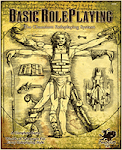I've never really given much thought to the use of poison in D&D 3.5/Pathfinder. Some monsters have it and can, on occasion, use it to good effect, but players rarely use it. First of all, there is the danger of a self-inflicted poisoning, a risk to which only assassins are immune. Also, poisons don't seem all that effective against any of the really powerful monsters you might actually want to use it on. Sure, you could use something like black lotus extract with its hefty save DC and its truly scary 1d6 Con damage per round, but at 4500 gp per dose, it isn't even remotely cost effective. Spells and swords can accomplish even more and generally don't cost a thing. However, with the addition of the alchemist class in Pathfinder, the use of poison is going to become more common and it may be time to examine the economics of poison (and alchemy in general).
I remember in the olden days, we used to butcher every poisonous monster we killed, trying to extract the precious poison glands for our own use or resale (assuming there wasn't a pesky paladin in the party). Of course, there was always a risk of being poisoned (an exaggerated risk, in my opinion), but it was worth it. There is, of course, nothing preventing a group from doing the same in Pathfinder, but, depending on how firmly the DM adheres to treasure rules, adjustments would have to be made to include the value of any poison in the treasure of the encounter. This could get tricky since a monster may have multiple doses or it might use up all its available poison in the fight, so the value of its poison could vary wildly and may, in fact, be more valuable than any treasure such a monster might be expected to possess.
Next, there is the question of how to extract the poison. In older versions of D&D, it didn't matter, you just did it and hoped the DM didn't have a fight with his girlfriend the night before. These sorts of things are more formalized now, so some sort of skill check is called for. An appropriate knowledge skill might be a possibility, but that means a different skill for different types of monsters. Also, knowledge skills usually involve theoretical, rather than practical knowledge, like knowing where the wyvern's venom sac is located, but not necessarily how to extract it intact. Craft (alchemy) includes the ability to make poison, but doesn't really seem to imply the anatomical knowledge of poisonous creatures. Survival would seem to skirt along the edges of this activity, since it includes tracking and hunting. It wouldn't be a stretch to include butchering monsters for their valuable body parts and it is a class skill for alchemists, leading me to believe that is what the Pathfinder design team has in mind.
The upshot of all this is right now, poisons are way too expensive, even if you make your own, to be a significant part of any PCs bag of tricks. The alchemist class will likely require some rule changes to make poison use more accessible.
-Rognar-
Wednesday, February 17, 2010
Subscribe to:
Post Comments (Atom)


6 comments:
Pretty cool blog you've got here. Thanx for it. I like such themes and everything that is connected to this matter. I definitely want to read more on that blog soon.
Kate Kuree
exclusive escorts
Rather nice place you've got here. Thanx for it. I like such topics and anything connected to them. I would like to read more on that blog soon.
Hilary Smith
ukraine escort
It is extremely interesting for me to read the article. Thank you for it. I like such themes and anything that is connected to this matter. I definitely want to read a bit more soon.
Bella Simpson
dublin escort service
I would like to read a bit more soon. BTW, rather good design you have here, but how about changing it every few months?
I am DMing a group and came up with my own rules for extraction. They are very similar to what you are talking about here. So I felt I would post it for you.
Extracting Poisons
1st- Roll the correct knowledge check for the beast with the poison(Arcana for dragons, nature for animals, ect, ect.) to locate the poison sack. Fail increases step two’s DC by 5. Assassin's skip this step do to their knowledge on poisons.
2nd-Roll a survival check DC 15 + HD of creature with the sack you are trying to extract. On a natural 1 you accidentally poison yourself. On failed check, half the doses rounded down are spoiled.
Special assassin's never poison themselves while extracting the sack.
3rd-The size of creature determines how many doses are possible to extract; tiny 1, small 1d2, medium 1d4, large 2d4, huge 2d8.
4th- For each dose, role a craft-alchemy check. DC = poison save DC. On failed check, that doses poison is spoiled. On a natural 1 you poison yourself. Assassins never poison themselves on a natural 1
I too, am a DM, and I use a very simple, yet surprising hability:
Heal.
It's the hability to cure, yes, but also to perform surgery, such as extracting a bodypart without spoiling it. DC is based on the poison DC, or on CR (still undecided on that, I keep going back and forth).
One of the features of this is that every party has someone with some ranks on Heal, but also offers an incentive to keep puting ranks on it during the higher levels (as the DCs for cargiving cap at around 15).
If the players want to keep the poison for later use (not this sesion), I call for a Craft(alchemy) check to stabilize it, plus half the cost of a dose in reagents (solves the "too much loot" issue, kindof).
I hope any of this is helpful to people out there.
Post a Comment